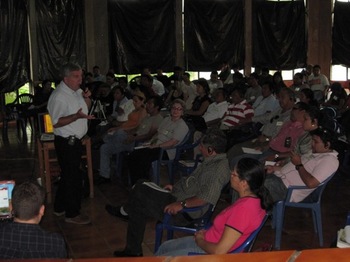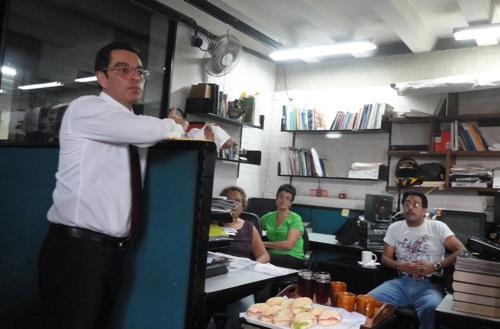Here are some questions to test your view about the importance of media ethics.
In developing countries, where news media struggle to survive, how relevant is talk of ethics? When economic and political problems stagger news media, is it worthwhile to talk principles and ideal aims?
Here are two views.
Hard-nosed, realist view: Ethics comes later, after we have a free and economically secure news media. Fix the practical problems, then talk ideals and principles.
Soft-nosed, idealist view: Talking ethics is always relevant and worthwhile, if you care about good journalism. Struggling journalists need ethics.
I agree in a general way with the latter view, but I find it glib — too soft.
The idealist view assumes too easily the universal value of ethics, without regard for different media ecologies. Assuming the value of ethics is an example of what J. S. Mill called “dead dogma” — a belief so basic and familiar that we have forgotten why we assert it.
It usually takes a jolt of reality to prompt a review of such beliefs. I recently experienced this jolt when I visited journalists and journalism educators in Guatemala to talk media ethics
It was not long before I wondered what in the world I was doing.
The Need for Media Reform

In Guatemala, a growing coalition of journalists, educators, and civic groups are attempting to build a media reform movement.
No wonder.
Many journalists are paid poorly, making bribes attractive. Politicians, criminal gangs, and others threaten and kill journalists who write unpopular truths about the civil war, drugs, or corruption. Concentration of ownership in broadcast media is high. Many newsrooms are so impoverished that they give in to pressure from advertisers. Academics who develop journalism education programs complain that many students (and working journalists) are not interested in talk of professionalism or ethics. Journalism is a job, not public service.
So I asked myself: Why talk ethics here? Doesn’t ethics take second place to creating better conditions for Guatemalan journalists?
This led me to re-examine and restate the case for ethics. I became a hard-nosed idealist.
Restating the case

We are acquainted with general reasons for media ethics. It encourages the responsible use of the freedom to publish. It encourages a more professional media that is aware of its social role and its capacity to help or harm.
In countries like Guatemala, where media reform is on the agenda, there are additional practical reasons to insert ethics into the mix.
First, journalists need clear ethical aims and principles to define and guide their movement, to justify their demands on government, and to criticize corrupt media practices.
Second, reformers need to articulate what they stand for, and they need to justify their ideas to the public. Journalists must explain how their calls for reform are not merely self-interested, partisan complaints. Reformers must show how their ideas would promote a healthy public sphere and are linked to the goals of other reform groups, such as human rights coalitions.
Otherwise, the public will dismiss journalistic initiatives, such as better freedom of information laws, as motivated by a prurient desire to report the private lives of individuals. This justification will rely ultimately on ethical reasoning about the value of a free press, why journalists should be independent, and the link between media and democracy.
Third, ethics needs to be part of journalism training and education programs so as to change the consciousness of the next generation of Guatemalan journalists, to inspire them with a larger vision of journalism.
Media ethics in Guatemala should include but also go beyond the teaching of fair and accurate reporting. Media ethics should be a form of social activism: an activism to create the news media system that Guatemala needs.
Grassroots ethics
Even if we agree that ethics is important, a question remains: how to insert ethics into the public discourse about media in Guatemala and similar countries?
Reformers should begin with a nationwide grassroots discussion that mobilizes journalists, and allows Guatemala journalists to define their problems and solutions. Ethics should not be a top-down imposition of values by foreign experts. The journalists need to decide for themselves the meaning of “serving the public” and “a free press” for Guatemalan society. The local and global should merge to form a Guatemalan philosophy of news media.
Also, the ethical discussion should not start with classroom discussions of abstract notions in ethics. Rather, discourse in the classroom and in meetings of journalists should be practical discussions of the media’s economic and political problems — and what types of social action could reduce the problems.
The goal of achieving fair wages and benefits for reporters, creating diversity of ownership, and protecting journalists from attacks should not be seen as issues “outside” of ethics. These issues are ethical issues. Ethics is not the use of high-minded language after the problems of news media are solved. Ethics addresses the tough, real-world issues of journalists.
So, after doubt and reflection, I have come back to affirm what I believed in the beginning — the importance of ethics. But the journey has been worth it. I better understand the reasons for my belief. I am more sensitive to how ethics should respond to differences among media ecologies.
My dead dogma is now a more lively belief, better suited for a complex media world.
Stephen J. A. Ward is director of the Center for Journalism Ethics in the School of Journalism and Mass Communications at the University of Wisconsin-Madison. He is the founding chair of the Canadian Association of Journalists’ (CAJ) ethics advisory committee and former director of UBC’s Graduate School of Journalism’s in Vancouver, B.C.

